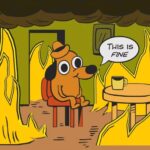The other day disaster struck in our garden when the nest box some blue tits have made their home in our fell off the wall.
We put it back (a little more securely this time!), but without high hopes, however were surprised to see them return soon after, getting on with making repairs.
And this got me thinking how in life sometimes bad things happen, sometimes the bird house falls off the wall. And that more often than not we get up and we go on anyway.
Anxiety and home-made horror movies
Often a tendency to anxiety goes hand in hand with a tendency to underestimate our resources to cope when the bad things happen. When we’re anxious we spend a lot of time imagining possible disasters (and I love Pete Walker’s phrase ‘home-made horror movies’ for the creative, personalised and uniquely terrifying scenarios we can create for ourselves). But often anxiety stops at exactly that point, the point of the bad thing happening. There’s no scene after that where you repair and recover and get help and go on. One of my favourite questions for working with anxiety is ‘and then what?’ What would you do, what could you do, if disaster struck?
What could you do, for example, if your friends criticisied you or you lost your job or you tried a new activity and were really bad at it? Those situations might feel like the end of the world when you’re in the grip of anxiety, but most likely if they actually happened, you’d handle it. In the case of criticism, you might listen to it, decide if it’s fair and valid and if an apology or change of behaviour is needed. Maybe doing something you enjoy to soothe the sting of criticsim. In the case of trying something new and finding it challenging you might decide to stick out the thing you feel bad at so you eventually improve, or decide that this hobby isn’t the one for you.
Anxiety is about survival
For those of us who have experienced trauma in childhood, bad things happened when we didn’t have any resources to cope. We were overwhelmed, powerless and alone. Often our brain and nervous system gets stuck in this time and it’s hard to update the programming. Anxiety is about survival, a brain and body response preparing us to fight or flee from a threat. Our survival responses don’t care very much if those threats are real or imagined. So even though you might know a situation is logically unlikely to occur, it’s very hard to talk yourself out of a response which is trying to save your life.
Remembering that was then, and this is now
Part of healing trauma and the work we do in therapy is helping our brains and our bodies to realise that was then and this is now. Allowing us to take in those cues of safety in the present can help our nervous system settle and move away from hypervigilance. For those of us no longer living with ongoing trauma, we are no longer as powerless as we were when we were children, we have options and resources and support that we never had back then. That doesn’t mean when bad things happen they won’t suck, just that we’re often far more resourced to cope with them than we (and our anxiety) give ourselves credit for.
If you’d like to find out more about how therapy can help you with anxiety so you feel more resourced to cope with life’s challenges, get in touch. You can book a free 20-minute meeting to see if we’d be a good fit to work together.






Recent Comments